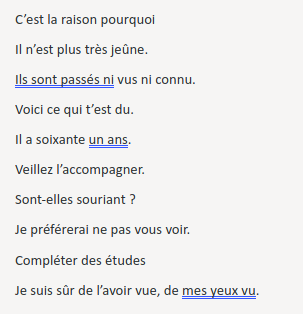I got a task to find good french grammar checker for a small group of people who learn french, but when comparing LanguageTool to Word 2016 I found that Word suggests the same indications as what LT does. Is there any french test file that can proves that LT can provides more errors and warnings than what Word 2016 can shows ? especially after adding n-grams and word2vec options ?
There is other websites that provides excellent and better results than LT, but what I want is to keep choices free and OSS because I want to use it with LibreOffice and replace Word from our small center.
Hello!
Here are ten examples taken out of our rules that the online version of Microsoft Word won’t pick up on (I don’t know if the online version has a different corrector, but I would doubt so?).
C’est la raison pourquoi
Word doesn’t see anything there, LanguageTool detects an Anglicism (“this is the reason why”) and advices the French alternative “C’est la raison pour laquelle”.
Il n’est plus très jeûne.
No error for Word, LanguageTool detects that there should only be an adjective, a verb, or a past participle where “jeûne” is, it being a noun.
Ils sont passés ni vus ni connu.
French idiom here, Word wants to correct to “Ils ne sont passés ni vus ni”; but that is not where the error is, LanguageTool correctly detects the error in the saying “ni vu ni connu.”
Voici ce qui t’est du.
Word doesn’t detect it, “du” is supposed to be the verb “devoir” so “dû”.
Il a soixante un ans.
Word and LanguageTool both suggest “un an” for number agreement, however, LanguageTool also suggest that there might be a missing word in “soixante-et-un ans”
Veillez l’accompagner.
Nothing to see here for Word, LanguageTool detects that this is probably “Veuillez” and not “Veillez” as in a form of suggestion.
Sont-elles souriant ?
Word does not see the gender and number disagreement, LanguageTool does.
Je préférerai ne pas vous voir.
Microsoft Word is correct in assuming there is no grammatical error here, however LanguageTool suggests that this might be the conditional “préférerais” rather than the future to express a wish.
Compléter des études
Word doesn’t see the anglicism here, “faire des études” is the French way to say it.
Je suis sûr de l’avoir vue, de mes yeux vu.
In this expression, Word wants the second “vu” to be in accordance with the noun, hence suggests “mes yeux vus” or “mon œil vu”. But in this very particular case of repetition, LanguageTool has the correct answer: “The second repeated word « vue » must here have the same agreement than the first word « vue »”.
Also, you’ll find that many LanguageTool rules feature an external link to a website explaining the grammatical (or any other) rule that the software is trying to correct (accessible with a simple click); I’m sure this would help greatly in learning the language and improving!
Have a great day.
Rigaut Théotime, rule editor for French.
Thanks really for this list of sentences, and you are right Word detects only 3 cases which appear to be false positive.

I will try to compile these examples into my answer to explain to them the importance and necessity of using a great grammatical corrector to improve their writing skills and avoid many mistakes that a beginner could commit.
Thanks again for your examples and your explanation. I know the task to find those examples is not easy because I tried many examples but failed to find good ones that trick Word. 
You’re very welcome! Hope you’ll find LanguageTool to be helpful! If there’s any problem, don’t hesitate to contact us.